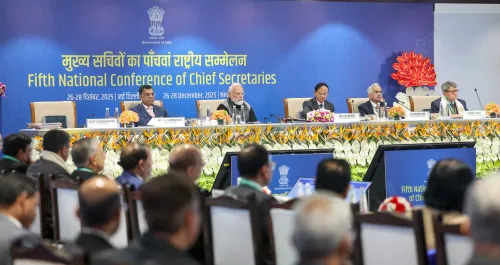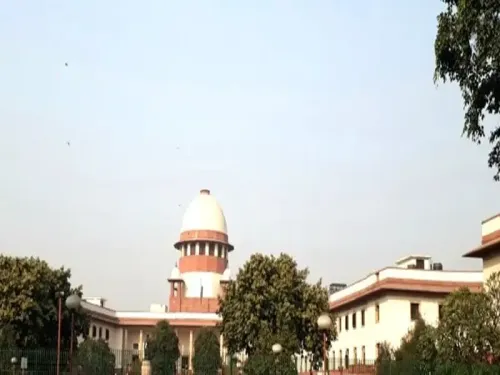Why Were 16 Arrested in Assam for Illegal Cattle Slaughter?

Synopsis
Key Takeaways
- 16 arrests made in Assam related to illegal cattle slaughter.
- CM Sarma emphasizes the balance between religious freedom and law enforcement.
- Locations of unauthorized slaughter sites identified.
- Ongoing tensions and protests reported in Hojai.
- Assam Cattle Preservation Act imposes strict regulations.
Guwahati, June 8 (NationPress) Assam's Chief Minister Himanta Biswa Sarma announced on Sunday that 16 individuals have been detained statewide for their involvement in alleged illegal cattle slaughter during the Eid-ul-Zuha festivities.
According to CM Sarma, remains of cattle were discovered in multiple locations throughout Assam, with five unauthorized slaughter sites pinpointed in the Barak Valley. These sites were identified in Gumrah, Silchar, and Lakhipur in Cachar district, alongside Badarpur and Banga in Karimganj district.
The detainees include nine individuals from Cachar and seven from Sribhumi. Additional reports highlighted the finding of cattle parts in areas such as Cotton University in Kamrup (Metro), Dhubri, Hojai, and Bagargool in Sribhumi.
“While our Constitution assures the right to practice religion, it also enforces the rule of law and public order,” CM Sarma stated on the social media platform X.
“Disturbing reports of illegal cattle slaughter and the recovery of cattle parts have emerged from various locations in Assam.”
CM Sarma reiterated the state’s commitment to maintaining communal harmony but cautioned that breaches of the law, irrespective of religious affiliations, would be met with firm consequences.
Under the Assam Cattle Preservation Act, 2021, cattle slaughter is forbidden in areas predominantly inhabited by Hindus, Jains, and Sikhs, as well as within five kilometers of temples or Vaishnavite monasteries (satras).
Although beef consumption is not banned, this Act enforces strict limitations on slaughter and sale.
Following claims of meat fragments being found in Hindu neighborhoods on Saturday night, tensions escalated in Hojai on Sunday.
In reaction, members of the Hindu community organized a road blockade in the Barpukhuri area.
A counter-demonstration by Muslims occurred in Bhuyanpatty, resulting in a clash with police, who reportedly used mild force to disperse the crowd, according to a senior police official.
“The situation is now under control, with additional paramilitary forces deployed. We are vigilantly observing the developments,” the official added.
Meanwhile, protests persist in Barpukhuri, where negotiations with demonstrators are ongoing. Residents in Hojai claim that meat was intentionally thrown onto their properties, though police have not corroborated these allegations.
A piece of meat was discovered wrapped in polythene near the Cotton University campus in Guwahati.
Authorities have collected the sample for forensic analysis. A similar incident occurred in Nalia, Dhubri district, where suspected meat pieces were found near a temple.
Officials stated that this material has also been sent for examination, and the situation in the area remains tranquil.










